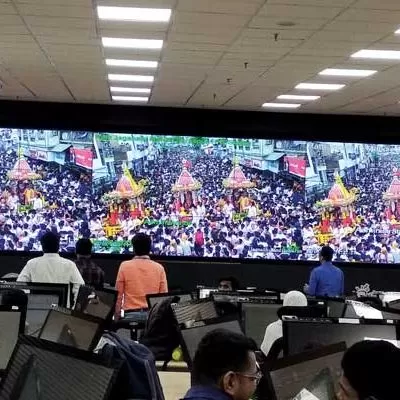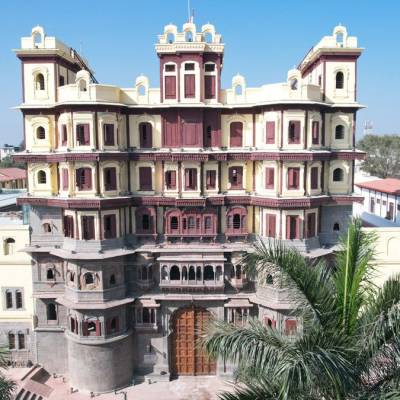- Home
- Infrastructure Urban
- SMART CITIES
- Multidimensional Dialogue on Capital Projects

Multidimensional Dialogue on Capital Projects
Date: October 7, 2015 Venue: Courtyard Marriott, Ahmedabad Organiser: DuPont Sustainable Solutions and CONSTRUCTION WORLD
India is witnessing an upsurge in mega infrastructure projects, such as industrial corridors, smart cities, ports, roadways, railways and energy. Investment forecasts include $7.5 billion for 100 smart cities, $137 billion in the rail network and $93 billion for highway projects. Soon the country will witness an increase in industrial investments, both in the public and private sectors.
Successful execution of these projects will have a cascading effect on industrial investment and economic growth. Past records in mega project execution have been patchy, with several projects suffering from cost overruns and delays. Cost overruns and underestimation have not decreased over the past 70 years and these create fundamental stress in systems, including financial institutions, key stakeholders and the community in general.
Common reasons for capital project failure
It is estimated that 65 per cent of mega projects fail with cost and schedule overruns > 25 per cent (Source: Merrow E W).
- Lack of coordination and engagement between the various project stakeholders.
- Existence of and adherence to a structured gate-keeping process.
- Wrong contracting model.
- Structured methodology on management of change.
So how do we boost capital project performance and meet the aspirations of stakeholders? How do we ensure projects get completed as per the expectations of our stakeholders? How do we achieve performance and operability that meets stakeholder needs and requirements?
To address these key issues, DuPont Sustainable Solutions - one of the 10 DuPont businesses - and CONSTRUCTION WORLD recently brought together senior leaders representing various organisations in Ahmedabad to discuss the challenges facing project execution and how each key stakeholder can play an important role in alleviating the same. The discussion was moderated by Sunil Parekh, Head Curator, World Economic Forum and Founding Curator, Ahmedabad Hub in India.
Key stakeholder representatives from across the spectrum like owners, contractors or EPC and financing organisations, who together ensure the success of any capital project, were brought together at the forum. The panellists included: Dr Jagadish Joshipura, General Manager, Gujarat State Finance Corporation (GSFC); Govardhan Gaddam, Vice President-Projects, SPML Infra Ltd; Swathi Buch, General Manager, Gujarat Infrastructure Development Board (GIDB) and Ravindra Gurjar, Business Director-South Asia, DuPont Sustainable Solutions (DSS).
The forum kicked-off with the keynote address delivered by Dipesh Shah, Vice President, Gujarat International Finance Tec-City (GIFT). Shah shared insightful stories about the complex nature of the GIFT project and highlighted the importance of multi-stakeholder coordination and involvement. He affirmed that integrated governance and adherence to well-defined contracting guidelines are the cornerstones to project success. His insights helped the audience develop a good understanding of the planning required for mega projects.
Gaddam, who represented the EPCs, emphasised upon the challenges faced by the contractor and EPC companies. Highlighting the issues like ambiguity in scope definition, cash flow, KPI definition and measurement and progress report, he spoke of the potential differences that can crop up between the expectations of the owner and the work executed by the contractor. He believes that setting clear, shared project objectives from the beginning, is vital to prevent these common problems. Gaddam finally laid stress upon the need for rigour in contracting and how the owner and EPC need to play a partnership role in aligning themselves on the project.
Dr Joshipura, who represented the financial institutions, put forward his viewpoints on financing and the current state of stalled projects, leading to large amount of NPAs with the banks. He also highlighted the challenges faced by financial institutions and how the execution of capital projects is critical to ensure appropriate returns. However, he was optimistic that with recent policy changes, the financing scenario will undergo a visible shift. He emphasised that the government needs to play a critical role in the development of the debt market, and everybody has to work on developing a good credit rating.
Buch expressed the owners´ perspective of managing capital projects. She highlighted some major challenges owners face, including ambiguity in setting the scope of the project, contracting process, gate-keeping and change management. She opined that timely and effective communication throughout the project implementation process should be an essential pre-requisite to ensure that the roles and expectations of owners and contractors remain well-balanced. She gave some valuable insights into the contract management process and shared her personal experiences, which added great value to the discussion.
Gurjar brought to the table his vast experience of supporting large capital projects across the Asia-Pacific region and India in particular. He shared some best practices that global organisations follow while executing capital projects, which enable them to complete projects within defined parameters and to the satisfaction of stakeholders. These include following a structured project management process, operability, gate-keeping, change management, contracting models, etc. He shared examples from prominent Indian projects to exemplify how various organisations look at project scenarios and take decisions that have an impact on their financial position. He believes that though issues like land acquisition, regulatory clearances and unforeseen circumstances are attributed primarily to project performance, proper project planning, adoption of global best practices, risk management and project execution play a pivotal role in making the project a success. He also emphasised that if a project, despite the initial cost overrun and time overrun, does not operate to full capacity or does not produce the required quality, it can even more adversely impact the rate of return of the project than the one time problem of cost or time overrun.
Parekh, who was moderating the session, raised a few thought-provoking queries about project ownership, management, risk sharing and execution, which captivated the audience and gave everyone an opportunity to cite some live examples. He engaged with the panel members to understand their challenges while executing projects in India. These included frequent scope changes, incomplete definitions of contracts, non-documented expectations, and issues with approval and cash flow.
What they Feel
¨Development of modern contracts and framing of contract, which are really balancing risk parameters in both private and public sectors, are important commitments of both parties,¨ - Swati Buch, General Manager, Gujarat Infrastructure Development Board (GIDB)
Overall integration is a key function and knowledge area for a project manager so other stakeholders can focus on their key areas,¨- Govardhan Gaddam, Vice President (Projects), SPML Infra Ltd
Capital effectiveness
Capital effectiveness is a demonstrated process for capital projects management that can reduce annual capital budget by 10-15 per cent or yield 10-15 per cent more from an existing budget. Using the method, a manufacturer with a multimillion dollar capital budget can achieve millions of dollars in increased value or complete more projects for the same budgeted dollars. Whether building a new plant, expanding a current facility or adding a new line, the key is to identify solutions that may not have been considered in terms of design, purchase, and capital.
- Courtyard Marriott
- DuPont Sustainable Solutions
- Construction World
- mega infrastructure projects
- Industrial Corridors
- Smart Cities
- Ports
- Roadways
- Railways
- Energy
- Highway Projects
- Sunil Parekh
- World Economic Forum
- Founding Curator
- Ahmedabad Hub
- EPC
- Dr Jagadish Joshipura
- Gujarat State Finance Corporation
- GSFC
- Govardhan Gaddam
- SPML Infra Ltd
- Swathi Buch
- Gujarat Infrastructure Dev
Maximising returns by addressing strategic and systemic issues Senior leaders representing various organisations came together to discuss the challenges facing the execution of capital projects and how stakeholders can play an important role in alleviating the same. Date: October 7, 2015 Venue: Courtyard Marriott, Ahmedabad Organiser: DuPont Sustainable Solutions and CONSTRUCTION WORLD India is witnessing an upsurge in mega infrastructure projects, such as industrial corridors, smart cities, ports, roadways, railways and energy. Investment forecasts include $7.5 billion for 100 smart cities, $137 billion in the rail network and $93 billion for highway projects. Soon the country will witness an increase in industrial investments, both in the public and private sectors. Successful execution of these projects will have a cascading effect on industrial investment and economic growth. Past records in mega project execution have been patchy, with several projects suffering from cost overruns and delays. Cost overruns and underestimation have not decreased over the past 70 years and these create fundamental stress in systems, including financial institutions, key stakeholders and the community in general. Common reasons for capital project failure It is estimated that 65 per cent of mega projects fail with cost and schedule overruns > 25 per cent (Source: Merrow E W). Lack of coordination and engagement between the various project stakeholders. Existence of and adherence to a structured gate-keeping process. Wrong contracting model. Structured methodology on management of change. So how do we boost capital project performance and meet the aspirations of stakeholders? How do we ensure projects get completed as per the expectations of our stakeholders? How do we achieve performance and operability that meets stakeholder needs and requirements? To address these key issues, DuPont Sustainable Solutions - one of the 10 DuPont businesses - and CONSTRUCTION WORLD recently brought together senior leaders representing various organisations in Ahmedabad to discuss the challenges facing project execution and how each key stakeholder can play an important role in alleviating the same. The discussion was moderated by Sunil Parekh, Head Curator, World Economic Forum and Founding Curator, Ahmedabad Hub in India. Key stakeholder representatives from across the spectrum like owners, contractors or EPC and financing organisations, who together ensure the success of any capital project, were brought together at the forum. The panellists included: Dr Jagadish Joshipura, General Manager, Gujarat State Finance Corporation (GSFC); Govardhan Gaddam, Vice President-Projects, SPML Infra Ltd; Swathi Buch, General Manager, Gujarat Infrastructure Development Board (GIDB) and Ravindra Gurjar, Business Director-South Asia, DuPont Sustainable Solutions (DSS). The forum kicked-off with the keynote address delivered by Dipesh Shah, Vice President, Gujarat International Finance Tec-City (GIFT). Shah shared insightful stories about the complex nature of the GIFT project and highlighted the importance of multi-stakeholder coordination and involvement. He affirmed that integrated governance and adherence to well-defined contracting guidelines are the cornerstones to project success. His insights helped the audience develop a good understanding of the planning required for mega projects. Gaddam, who represented the EPCs, emphasised upon the challenges faced by the contractor and EPC companies. Highlighting the issues like ambiguity in scope definition, cash flow, KPI definition and measurement and progress report, he spoke of the potential differences that can crop up between the expectations of the owner and the work executed by the contractor. He believes that setting clear, shared project objectives from the beginning, is vital to prevent these common problems. Gaddam finally laid stress upon the need for rigour in contracting and how the owner and EPC need to play a partnership role in aligning themselves on the project. Dr Joshipura, who represented the financial institutions, put forward his viewpoints on financing and the current state of stalled projects, leading to large amount of NPAs with the banks. He also highlighted the challenges faced by financial institutions and how the execution of capital projects is critical to ensure appropriate returns. However, he was optimistic that with recent policy changes, the financing scenario will undergo a visible shift. He emphasised that the government needs to play a critical role in the development of the debt market, and everybody has to work on developing a good credit rating. Buch expressed the owners´ perspective of managing capital projects. She highlighted some major challenges owners face, including ambiguity in setting the scope of the project, contracting process, gate-keeping and change management. She opined that timely and effective communication throughout the project implementation process should be an essential pre-requisite to ensure that the roles and expectations of owners and contractors remain well-balanced. She gave some valuable insights into the contract management process and shared her personal experiences, which added great value to the discussion. Gurjar brought to the table his vast experience of supporting large capital projects across the Asia-Pacific region and India in particular. He shared some best practices that global organisations follow while executing capital projects, which enable them to complete projects within defined parameters and to the satisfaction of stakeholders. These include following a structured project management process, operability, gate-keeping, change management, contracting models, etc. He shared examples from prominent Indian projects to exemplify how various organisations look at project scenarios and take decisions that have an impact on their financial position. He believes that though issues like land acquisition, regulatory clearances and unforeseen circumstances are attributed primarily to project performance, proper project planning, adoption of global best practices, risk management and project execution play a pivotal role in making the project a success. He also emphasised that if a project, despite the initial cost overrun and time overrun, does not operate to full capacity or does not produce the required quality, it can even more adversely impact the rate of return of the project than the one time problem of cost or time overrun. Parekh, who was moderating the session, raised a few thought-provoking queries about project ownership, management, risk sharing and execution, which captivated the audience and gave everyone an opportunity to cite some live examples. He engaged with the panel members to understand their challenges while executing projects in India. These included frequent scope changes, incomplete definitions of contracts, non-documented expectations, and issues with approval and cash flow. What they Feel ¨Development of modern contracts and framing of contract, which are really balancing risk parameters in both private and public sectors, are important commitments of both parties,¨ - Swati Buch, General Manager, Gujarat Infrastructure Development Board (GIDB) Overall integration is a key function and knowledge area for a project manager so other stakeholders can focus on their key areas,¨- Govardhan Gaddam, Vice President (Projects), SPML Infra Ltd Capital effectiveness Capital effectiveness is a demonstrated process for capital projects management that can reduce annual capital budget by 10-15 per cent or yield 10-15 per cent more from an existing budget. Using the method, a manufacturer with a multimillion dollar capital budget can achieve millions of dollars in increased value or complete more projects for the same budgeted dollars. Whether building a new plant, expanding a current facility or adding a new line, the key is to identify solutions that may not have been considered in terms of design, purchase, and capital.



















